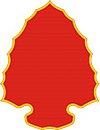| 109th Field Artillery Regiment | |
|---|---|
 Coat of arms Coat of arms | |
| Country | |
| Branch | |
| Type | |
| Role | USARS parent regiment |
| Size | regiment |
| Insignia | |
| Distinctive unit insignia |  |
| Should Sleeve Insignia of the 28th Infantry Division, worn by the 109th FA |  |
| U.S. Field Artillery Regiments | ||||
|
The 109th Field Artillery Regiment is an artillery regiment of the United States Army and the Pennsylvania Army National Guard.
The unit was organized on 17 October 1775 and is one of several National Guard units with colonial roots. The first unit commander was Colonel Zebulon Butler. The unit traces is origins to the Connecticut Militia under the 24th Regiment since the Wyoming Valley was a part of Connecticut at the time. After alternating between an infantry and artillery unit throughout the early years and campaigns, the battalion was designated as the 109th Field Artillery Regiment on 11 October 1917. The regiment served in combat during World War I and was commanded by Colonel Asher Miner.
During the 1950s and 1960s, under the Pentomic army structure, the 2nd Battalion, 109th Artillery, served with the 28th Division.
1st Battalion
1st Battalion, 109th FA, (the "Wyoming Valley Guards") is a battalion of the United States Army, maintained by the Pennsylvania Army National Guard. It is a subordinate formation of the 169th Field Artillery Brigade. Its headquarters is at the historic Kingston Armory located in Kingston, PA. The unit was organized on 17 October 1775 and is one of the oldest military units in the United States Army.
In 1984-85 the 1st Battalion was part of the divisional artillery of the 28th Infantry Division.
Recent news articles in 2014 and 2015 stated the 55th BCT is under consideration for inactivation by late 2016 and as a result may inactivate the battalion.
The task organization has changed multiple times throughout the decades as the force structure of the Army and National Guard changes. As of 2015, the task organization consists of Headquarters, Headquarters Battery, Alpha Battery, Bravo Battery, Charlie Battery, and 2803 Forward Support Company.
Campaign participation credit
Revolutionary War
- Brandywine
- Germantown
- New Jersey 1777
- Pennsylvania 1777
- Pennsylvania 1778
- Pennsylvania 1779
Mexican War
- Vera Cruz
- Cerro Gordo
Civil War
- Chancellorsville
- Gettysburg
- Wilderness
- Spotsylvania
- Cold Harbor
- Petersburg
- Virginia 1861
- Virginia 1863
World War I
- Oise-Aisne
- Ypres-Lys
- Meuse-Argonne
- Champagne 1918
- Lorraine 1918
World War II
- Normandy
- Northern France
- Rhineland
- Ardennes-Alsace
- Central Europe
War on Terrorism
- To Be Determined
Decorations
- Presidential Unit Citation (Army), Streamer embroidered ARDENNE
- Luxembourg Croix de Guerre, Streamer embroidered LUXEMBOURG
Heraldry
Coat of arms
Distinctive unit insignia
References
- Zierdt, William (1932). Narrative History of the 109th Field Artillery (1st ed.). Wilkes-barre, PA.: Wyoming Historical and Geological Society.
- Leonard, John W., ed. (1922). Who's who in Finance, Banking, and Insurance. Brooklyn, NY: Who's Who In Finance Incorporated. p. 474 – via Google Books.
- Isby and Kamps, Armies of NATO's Central Front, Jane's Publishing Company, 1985, p.383.
- "109th Field Artillery Regiment Lineage and Honors, U.S. Army Center of Military History (CMH)". www.history.army.mil. Retrieved 11 October 2015.
| Artillery formations of the United States | |||||||||||||
|---|---|---|---|---|---|---|---|---|---|---|---|---|---|
| Misc. formations | |||||||||||||
| Air Defense Artillery | |||||||||||||
| Coast Artillery |
| ||||||||||||
| Field Artillery |
| ||||||||||||